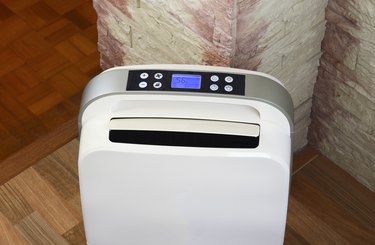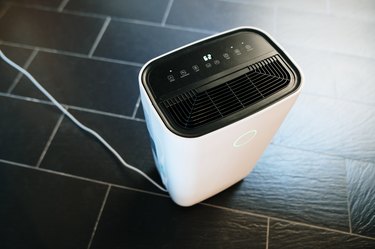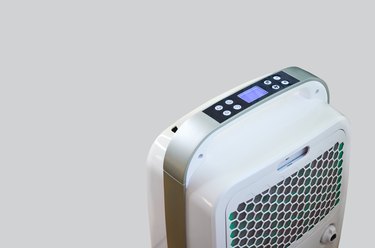
If you suffer from allergies or want to prevent mold growth in your home, a dehumidifier is an essential appliance. Before you go out and grab one of these devices, though, it's important to recognize some of the many dehumidifier disadvantages, as these products are not without drawbacks. Carefully select the model that best suits the environment in which you will place it. You may be surprised at how much more comfortable your home feels once you've removed excess moisture from the air.
What Is a Dehumidifier, and Do I Need One?
Video of the Day
As you might guess by the name, a dehumidifier is an appliance that sucks moisture out of the air, condensing it into water. While it does so, dehumidifiers also remove some pollutants and allergens from your indoor air. Not everyone needs a dehumidifier (especially those with air conditioners, which perform a similar function), but it can be beneficial if your home has high humidity or if someone in your home has allergies. Signs that you could use a dehumidifier include:
Video of the Day
- Someone in your home regularly suffers from severe respiratory allergies or symptoms such as a runny nose or cough.
- One or more areas of your home have a musty smell.
- Your clothes smell damp or moldy even after they are freshly cleaned.
Tip
A humidifier adds humidity to your home, so if you have dry air, you may need a humidifier instead of a dehumidifier.
When shopping for a dehumidifier, you have two options: portable or whole-house. A portable unit is ideal for dehumidifying small spaces, while a whole-house dehumidifier is ideal if you want to dehumidify your entire home.What Are Some Dehumidifier Advantages?
What Are Some Dehumidifier Advantages?

A dehumidifier can reduce the overall humidity level in your home, which may make your home more comfortable and reduce symptoms of allergies and respiratory illnesses. Here are some dehumidifier pros to keep in mind.
Pro: Helps With Allergies
Excess moisture in the air promotes mildew and mold growth, and mold spores cause allergy symptoms in many people. Individuals who suffer from dust allergies can also benefit from an environment that is lower in humidity since dust mites — the reason for dust allergies — need between 60 and 80 percent relative humidity to thrive. Running a dehumidifier can reduce the relative humidity in your home to 50 percent or lower. Eliminating problems with dust mites and mold in your home may result in better health and less reliance on allergy medications.
Pro: Increases Comfort
If you had to choose between being in a room that is 80 degrees and 90 percent humidity or a room that is 80 degrees and 50 percent humidity, chances are you'd choose the latter. Lower humidity can help you feel more comfortable, even when temperatures are high, as sweat evaporates more easily from your body in drier air. You may be comfortable keeping your thermostat a few degrees higher in the summer, which can save you money on your energy bill.
What Are Some Dehumidifier Disadvantages?

While dehumidifiers can improve the indoor air quality in your home, they are not right for everyone. Here are some dehumidifier disadvantages that homeowners should be aware of before purchasing one of these appliances.
Con: Noise and Heat
Depending on the type of dehumidifier you have, they can be surprisingly loud. This noise isn't usually a problem if the dehumidifier is located in a basement, but if you plan to place a dehumidifier in a living space or bedroom, select a model that's quiet enough for those environments. Dehumidifiers also tend to blow warm air out of the back of the unit. While the amount of heat typically is minimal, you can keep it out of the room you're in by facing the back of the dehumidifier into a doorway.
Con: May Increase Your Energy Bill
If you use a dehumidifier to lower the moisture level in your home, your monthly energy costs may go up by over $50, although an increase of $15 to $35 is more typical. Fortunately, you are likely to incur these additional electricity costs only during the summer unless you live in an area that is warm year-round, such as south Florida. You can reduce the amount you spend to run the dehumidifier by purchasing an energy-efficient Energy Star model, which will have little effect on your electricity bill.
Con: Requires Regular Maintenance
Dehumidifiers collect water in a storage tank that must be routinely emptied and cleaned as often as once daily or more during damp weather conditions. Some models also feature a removable air filter that must be cleaned regularly. On many dehumidifiers, you can reduce your maintenance requirements by installing a drain hose that empties collected water into a floor-level drain.